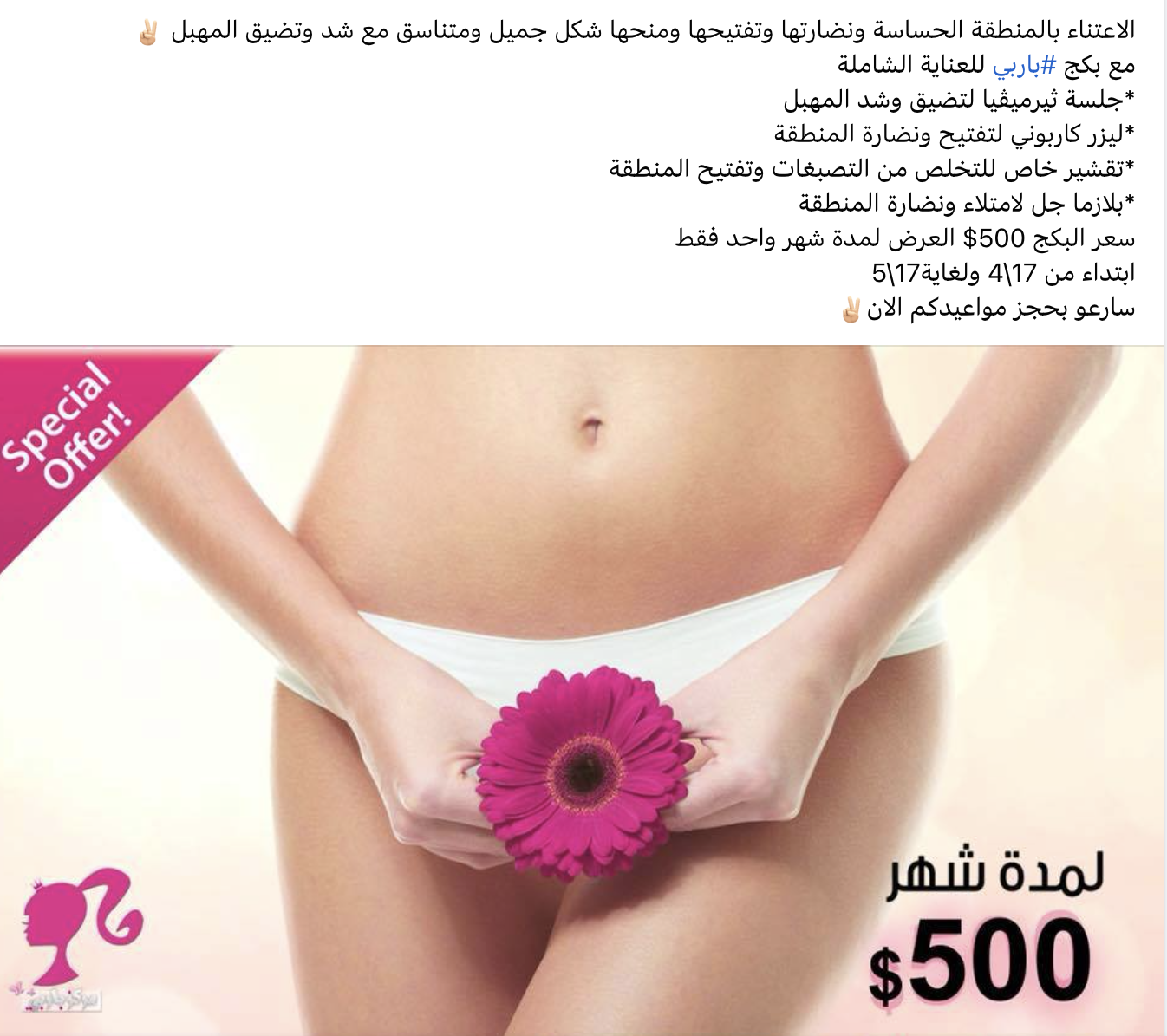This report is part of the "Not on the Margins" project, which sheds light on freedoms, and sexual and reproductive health and rights in Lebanon and the Arab world.
As her wedding day approached, Rusul (pseudonym) became increasingly anxious about her body and appearance. This anxiety led the 25-year-old to undergo cosmetic procedures, including surgery to enhance the appearance of what she calls her body’s "sensitive region," the vagina.
Rusul says she spent hours in her room, losing track of time, while searching online and on social media for the best beauty centers. She found numerous advertisements promising brides-to-be that the surgery would make their genitals look "like snow white."
"I spent the dowry I received from my husband on wedding preparations, such as makeup, perfumes, and nightgowns. To perform plastic surgery on my “sensitive region.” I needed to spend an additional 1 million Iraqi dinars (about 660 USD). I was never satisfied with its appearance and always felt ashamed and anxious," Rusul explained.
Months before her wedding, Rusul started using "whitening creams" she bought from pages promoting these products. However, she didn't achieve the results she wanted. A friend then advised her to visit a beauty center.
"I started undergoing chemical peeling sessions and plasma injections for my sensitive area, but I couldn't continue due to the high cost—each session was around $70," said Rusul.
In recent years, some procedures have become increasingly popular in Iraq. There's a noticeable increase in marketing for these cosmetic operations on social media. They often feature package deals that offer a combination of cosmetic treatments for the "sensitive area" at a reduced price, encouraging more women to undergo them and increasing demand.
Not satisfied with these treatments, Rusul decided to undergo a "labia reduction" surgery, also known as a labiaplasty. This procedure involves removing part of the inner labia or completely removing it except for some small ends. This surgery is marketed as having benefits, including boosting self-confidence, improving comfort, and eliminating infections and odors. It also purportedly boasts aesthetic enhancements, such as "reducing signs of aging in the intimate area," making it appear "softer, smoother, and more feminine."
Labiaplasty is performed using a laser or through surgical intervention under local or general anesthesia, and typically takes one to two hours. It can take up to two months for the wound to fully heal. Potential risks include scarring, bleeding, infection, or a decrease in the sensitivity of the genital area.
The cost of labiaplasties ranges from $200 to $500, depending on the clinic or center where the procedure is performed and the method used. These procedures are carried out by specialized doctors or occasionally by midwives.
"Everyone blamed me for my husband's infidelity, saying I had let myself go, and that cosmetic surgery on my body was the best solution. But he still cheated on me after the surgeries"
"Just like Barbie"
Cosmetic surgeries for female genitalia include a wide range of procedures, such as vaginal tightening (vaginoplasty), fat removal and liposuction, fat injections or fillers, and, most commonly, the reduction of the labia minora and labia majora.
Recently, a cosmetic trend known as "the Barbie Vagina" has spread across Iraq. This term refers to a set of cosmetic procedures aimed at "enhancing the appearance and shape of the vagina." These procedures include labia reduction, vaginal tightening, whitening of dark areas, and improving the appearance of surrounding tissues. The package is marketed as giving the female genital area a "younger and fresher" look, recreating the idealized image associated with dolls like Barbie.
 A screenshot of an advertisement for a beauty center
A screenshot of an advertisement for a beauty center
In recent years, these procedures have become increasingly popular in Iraq. There is a noticeable increase in marketing for these cosmetic operations on social media. They often feature package deals that offer a combination of cosmetic treatments for the "sensitive area" at a reduced price, encouraging more women to undergo them and increasing demand.
Hanin (pseudonym), a 27-year-old mother of two, decided to undergo procedures to tighten her uterine muscles and vagina. She was inspired by beauty centers’ TikTok advertisements and a Facebook group where women from her city, Hilla, shared their experiences. The doctor who operated on her recommended adding labia reduction to the procedures she was undergoing, claiming that the size of her labia was large and that their removal would make the vagina look "smaller and softer." Despite the increased financial cost, Hanin agreed.
These advertisements fuel anxiety among married women who have given birth or those preparing for marriage. They intensify the pressure that societal standards impose on women’s bodies. According to sociologist and relationship counselor Sarah Albaa, "anxiety about the appearance of genitalia is what drives women to choose these procedures." She explained in an interview with Raseef22 that "pornography promotes an ideal appearance of the vagina desired in sex, which helps create an imagined and unrealistic standard for the shape and color of the vagina, leaving women feeling anxious and lacking self-confidence."
Vaginoplasty is one of the oldest practices of "vaginal beautification." Commonly known as the “husband stitch,” its initial aim was to tighten the vaginal opening after natural childbirth and to increase sexual pleasure for a husband. This practice is considered to be a form of obstetric violence - a term that references unnecessary or painful medical procedures performed without a woman's explicit consent.
According to sexual health specialist Dr. Farah Rifaat, some women view vaginal tightening as a necessary step toward fulfilling “a woman’s desire to be perfect by nature and instinct.” Rifaat notes that this desire is often influenced by marketing advertisements or negative comments from doctors about their patients' bodies, which she believes are a part of the marketing strategy for these procedures. She also points out the impact of social media on women's self-confidence and in building a desire to undergo these operations.
"Marketing is the main pillar sustaining the popularity of these procedures. It heightens women's fears and promotes the idea of an ideal vulva appearance, ignoring the natural diversity among women and relying on specific cultural standards of beauty and femininity," says Rifaat. She argues that this trend "eliminates the natural differences between women's bodies and aims to make them look the same." Rifaat emphasizes the importance of consulting a specialized and experienced doctor before undergoing these procedures to avoid "catastrophic" mistakes, such as genital mutilation, and highlights potential and harmful side effects like sudden bleeding, infection, or scarring.
Just like Snow White
Iraqi women face significant social pressure to meet their partners' expectations of feminine beauty, especially if they are experiencing infidelity or receiving negative comments about their bodies. Surwa (pseudonym) explained to Raseef22, her husband’s repeated infidelities and her fear of aging pushed her to decide on a "complete makeover of the vaginal area." The 36-year-old coincidentally discovered a “package offer" on the Instagram page of a well-known beauty center in Baghdad.
"I decided to undergo these cosmetic procedures because of my husband's repeated infidelities and multiple relationships with other women. I started imagining the bodies of the women he was involved with, picturing them as film stars. I began feeling ashamed of my body, especially my vagina, which changed shape after multiple births."
Surwa underwent vaginoplasty, labiaplasty, and bleaching, which involved a "course of whitening injections."
"The doctor used injections to whiten the area, and also used filler injections, which made the area look younger," says Surwa. She adds, "A woman facing such a situation feels the need to regain her husband's confidence in her beauty and femininity." She continues, "Everyone blamed me for my husband's infidelity, saying I had let myself go, and that surgery was the best solution."
Surwa says that her sex life improved slightly for a while, and her self-confidence increased. However, her husband’s infidelity and the resulting fights did not stop, leading her to feel that all her efforts were in vain.
Before the rise in popularity of modern whitening procedures, the go-to option for women wishing to lighten their genitals was a homemade remedy. Known as “al-khalta” (“the mixture”), they are made of various herbs. Dermatologist and skin treatment specialist Dr. Imad Rmeidh notes that today, these mixtures are often combinations of several chemical "whitening creams" available in pharmacies.
Before the rise in popularity of modern whitening procedures, the go-to option for women wishing to lighten their vaginas was a homemade remedy. Known as “al-khalta” (“the mixture”), they were made of various herbs. Dermatologist and skin treatment specialist Dr. Imad Rmeigh notes that today, these mixtures are often combinations of several chemical "whitening creams" available in pharmacies.
"Each center or clinic has its own whitening khalta, but there is no confirmed information about the components of these mixtures. It is believed that they contain high concentrations of monobenzone, a chemical used to treat vitiligo but can cause the death of skin pigment cells with prolonged use in high concentrations. They may also contain high concentrations of cortisone, which can cause dryness, redness, itching, and cracking of the skin. Its use is easily recognizable by the side effects on the patient," Rmeidh says to Raseef22.
"The results of these mixtures are temporary and pose significant health risks to patients. A substance like monobenzone should only be used under medical supervision due to its side effects, which include skin irritation, peeling, and the death of pigment cells."
 A screenshot of an advertisement for a beauty center
A screenshot of an advertisement for a beauty center
In addition to whitening mixtures, pharmacies, cosmetic clinics, and beauty centers are full of many products marketed as skin and "sensitive area" whitening agents. One of the most notable is glutathione injections, which the US Food and Drug Administration has warned against due to their toxic side effects on the liver, kidneys, and nervous system.
The “Husband Stitch” and obstetric violence
Vaginal tightening surgery, also known as vaginoplasty, is one of the oldest practices of "vaginal beautification." Commonly known as the “husband stitch,” its initial aim was to tighten the vaginal opening after natural childbirth, enhancing the tightness of the area and increasing sexual pleasure for a husband. This technique involves suturing to repair a tear in the perineum (the area between the vagina and rectum) that often occurs during childbirth. This practice is considered a form of obstetric violence—a term that references unnecessary or painful medical procedures performed without a woman's explicit consent.
Despite the negative outcomes and numerous complications, such as deformities in the area and dyspareunia, this practice continues.
Today, vaginal tightening is done in two ways: surgically or using laser technology. Women seek these procedures after multiple births, at the request of their partner, or due to aging. The procedures are marketed as ways to "restore youth" and "make you feel like a bride again."
 A screenshot of an advertisement for a beauty center
A screenshot of an advertisement for a beauty center
In the absence of governmental oversight, unqualified individuals, such as midwives, have entered this field, performing these procedures in non-sterile environments. This has increased the risk of failure and put women's lives at risk. These procedures are often carried out at home or in so-called "home clinics."
Mustafa Jafar, head of the disciplinary committee of the Iraqi Nursing Association, told Raseef22 that the law sets conditions and boundaries for the practice of midwifery. This includes prohibiting midwives from delivering first-time mothers, women pregnant with twins, or women with difficult deliveries. The law also prohibits midwives from providing contraceptives or performing any kind of surgical intervention.
"The law also strictly forbids any midwife from performing cosmetic genital procedures. However, midwives who engage in these practices often evade punishment because the Nursing Association cannot act without a formal complaint from an affected woman, which, unfortunately, is rare due to social customs and norms."
Dr. Aqeel Shaker Mahmoud, president of the Iraqi Medical Syndicate, told Raseef22 that opening any cosmetic clinic requires a license from the association and supervision from a specialist in cosmetic surgery or dermatology. This licensing is part of the association's efforts to monitor the advertisement of cosmetic procedures. The promotion of cosmetic services and overreach of authority has led to the revocation of licenses for several midwives in Baghdad and other cities.
Sexual health specialist Dr. Farah Rifaat notes that women's desire to appear perfect is often influenced by marketing advertisements or negative comments from doctors about their patients' bodies, which she believes are a part of the marketing strategy for these procedures.
Studies and research
In a study titled, “Elective Female Obstetricians and Gynecologists,” The American College of Obstetricians and Gynecologists recommends that doctors inform women about the lack of high-quality data supporting the efficacy of these surgical procedures and advise them on potential complications.
The study emphasizes that doctors should reassure the women considering these procedures that the size, shape, and color of external genitalia vary greatly among women and can change due to factors such as puberty, childbirth, aging, and decreased estrogen levels.
The study debunked beliefs that cosmetic genital surgery improves sexual function. It highlights that current evidence does not suggest such surgery leads to improvements in body image, sexual desire, or sexual satisfaction after surgery.
The study also stresses the importance of doctors understanding the reasons behind a patient's desire for such surgeries. Doctors should receive adequate training to identify women who may suffer from sexual dysfunction, depression, and anxiety, and refer those suspected of these issues for evaluation before seriously considering the surgery.
Raseef22 is a not for profit entity. Our focus is on quality journalism. Every contribution to the NasRaseef membership goes directly towards journalism production. We stand independent, not accepting corporate sponsorships, sponsored content or political funding.
Support our mission to keep Raseef22 available to all readers by clicking here!
Interested in writing with us? Check our pitch process here!




